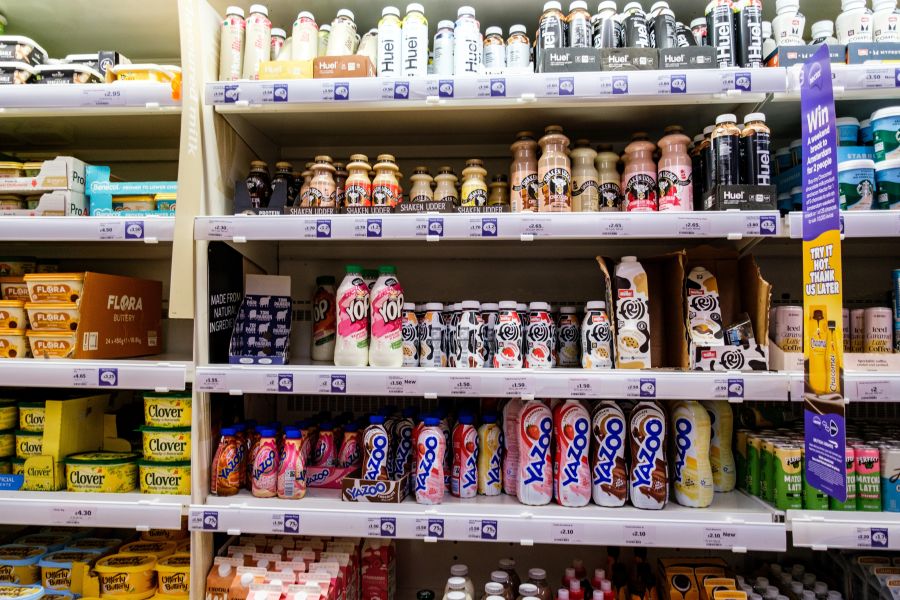
- Industry news
Industry news
- Category news
Category news
- Reports
- Key trends
- Multimedia
- Journal
- Events
- Suppliers
- Home
- Industry news
Industry news
- Category news
Category news
- Reports
- Key trends
- Multimedia
- Events
- Suppliers
UK soft drinks levy extension raises industry concerns over “moving goalposts” after reformulation success
Key takeaways
- UK extends sugar levy to milk-based drinks and lowers threshold to 4.5g per 100ml from January 2028.
- Industry expresses “disappointment” at “moving goalposts” after achieving 89% compliance with existing standards.
- Lactose allowance introduced while 203 milk-based drinks requiring reformulation comprise 93% of category sales.

The UK government has confirmed it will extend the Soft Drinks Industry Levy (SDIL) to milk-based beverages and lower the sugar threshold from 5g to 4.5g per 100ml. These changes come after manufacturers have already achieved near-universal compliance with existing standards.
Health Secretary Wes Streeting announced the measures yesterday, stating they could cut 17 million calories daily from national intake and lead to almost £1 billion (US$1.26 billion) in health and economic benefits. The changes, effective January 1, 2028, will apply to pre-packaged milk-based drinks, including supermarket milkshakes, flavored milks, sweetened yogurt drinks, and ready-to-drink coffees.
“An unhealthy start to life holds kids back from day one, especially those from poor backgrounds like mine,” says Streeting. “We’re on a mission to raise the healthiest generation of children ever, and that means taking on the biggest drivers of poor health.”
Industry concerns over “moving goalposts”
Since the SDIL’s introduction in 2018, manufacturers have achieved a 46% average reduction in sugar content across soft drinks in the scope of the levy. Between 2015 and 2019, approximately 65% of drinks that would have been caught by the original 5g threshold reformulated to fall below it, representing the removal of nearly 750 million kilograms of sugar from soft drinks between 2015 and 2024.
However, the government consultation response, published on November 25, revealed traditional soft drink producers expressed “strong opposition” to threshold changes, noting “disappointment that despite a program of reformulation bringing 89% of drinks under the levy threshold, the government was “moving the goalposts” on the soft drinks industry with proposals that require additional reformulation investment.
A spokesperson for the UK Food and Drink Federation tells Food Ingredients First: “The government could provide broader and more accessible financial support for reformulation and healthier product innovation, by expanding R&D tax credits to apply to the development of healthier products, allowing companies to offset the significant upfront costs that can be a barrier to progress.”
The consultation found that, despite the industry’s reformulation achievements, producers and trade associations opposed the threshold reduction, saying it would require “additional reformulation investment” after companies had already brought 89% of drinks under the existing levy threshold.
Timeline extended for deposit return scheme
The government extended the implementation date from its initially proposed April 2027 to January 2028, explicitly citing industry concerns about the concurrent Deposit Return Scheme rollout, scheduled for 2027.
 Pre-packaged milkshakes will be subject to the UK sugar tax from January 2028 unless manufacturers reformulate below 4.5g sugar per 100ml.“The government also acknowledges that the soft drinks industry will be working to deliver the new Deposit Return Scheme up to and within 2027,” according to the consultation response. “Taking this into account, the government has extended the proposed implementation date by nine months to January 1, 2028. This will allow over two years for reformulation from the point at which policy is confirmed.”
Pre-packaged milkshakes will be subject to the UK sugar tax from January 2028 unless manufacturers reformulate below 4.5g sugar per 100ml.“The government also acknowledges that the soft drinks industry will be working to deliver the new Deposit Return Scheme up to and within 2027,” according to the consultation response. “Taking this into account, the government has extended the proposed implementation date by nine months to January 1, 2028. This will allow over two years for reformulation from the point at which policy is confirmed.”
The current levy rates stand at £1.94 per 10 liters (US$2.45/10L) for drinks containing 4.5g to 7.9g of total sugar per 100ml, and £2.59 per 10 liters (US$3.27/10L) for drinks above 8g per 100ml.
Milk-based drinks brought into scope
The extension to milk-based drinks marks a significant policy shift, as these products have been exempt since the levy’s 2018 introduction due to concerns about calcium intake among young people. However, government analysis now indicates young people obtain only 3.5% of calcium intake from milk-based drinks, compared with 25% from plain milk.
Katharine Jenner, executive director at Obesity Health Alliance, says: “Ending the exemption for sugary milkshakes and bringing more sugary soft drinks into the levy is a sensible and long-overdue step to protect children’s health — especially their teeth. The SDIL has already removed billions of teaspoons of sugar from the nation’s diet without harming industry growth, proving that clear, consistent rules are effective.”
The government will introduce a “lactose allowance” to account for naturally occurring sugars in milk. The allowance will apply to drinks irrespective of milk content percentage, calculated based on actual lactose content from all sources including milk powder. The allowance will not apply where lactose is added as a separate ingredient or in lactose-free dairy products where lactose has been broken down through the addition of lactase.
In 2024, UK F&B manufacturers invested £180m (US$238m) in innovation to develop healthier products.According to government data, 203 pre-packed milk-based drinks currently on the market have a total sugar content of 5g or above per 100ml, comprising 93% of sales in the category.
Barbara Crowther, children’s food campaign manager at Sustain, says: “This update rightly prioritizes children’s health over corporate profit. The Soft Drinks Industry Levy has brilliantly succeeded in getting companies to reduce sugar, and treating sugary milkshakes the same as fizzy drinks is the right thing to do.”
“Companies who’ve already reduced sugar will now be rewarded for acting responsibly, while those still stacking excess sugar into milkshakes will now have a clear choice: change their recipe or pay for the health harm caused.”
Health impact projections
The government estimates the changes will reduce daily calorie intake by approximately 4 million in children and 13 million in adults across England, potentially preventing almost 14,000 cases of adult obesity and nearly 1,000 cases of childhood obesity. The measures are expected to save the NHS £36 million (US$45.4 million) and reduce social care pressures by £30 million (US$37.9 million).
“The existing Soft Drinks Industry Levy has already substantially reduced the amount of sugar in shop-bought products, helping slow the increase in childhood obesity and bring down hospital admissions for tooth extractions among young children,” says England’s chief medical officer, Professor Sir Chris Whitty. “Extending the sugar levy is likely to have further benefits for child health.”
Between 2015 and 2024, the existing levy contributed to substantial reductions in hospital admissions for children requiring caries-related tooth extractions, with decreases of over 28% among children aged 0-4 and more than 5% among those aged 5-9.
Eddie Crouch, British Dental Association chair, says: “The success of this policy won’t be about filling the black hole in the public finances; it will be whether industry will reformulate. Voluntary action here has achieved nothing. But since it rolled out in 2018, the sugar levy has led the industry to remove tens of thousands of tonnes of sugar from soft drinks.”
The changes form part of a broader government obesity strategy that includes banning junk food advertisements before the 9 pm watershed and prohibiting the sale of high-caffeine energy drinks to under-16s.
Plain, unsweetened milk and milk-alternative drinks remain outside the levy’s scope, as do open-cup milkshakes made to order in cafes and restaurants. The extended levy is expected to raise £40-£45 million (US$50.5-$56.8 million) annually in additional tax receipts once implemented.











